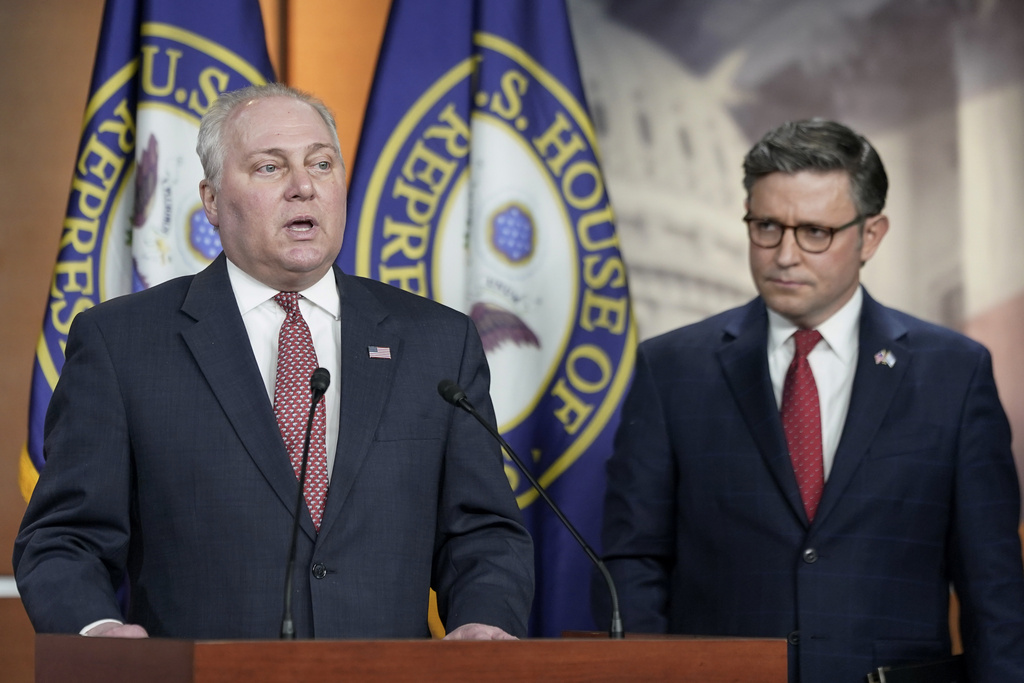

House GOP leadership vowed on Sunday to kill the Senate’s bipartisan defense supplemental spending package after the long-awaited deal was unveiled.
Senate appropriators released the legislative text of the bill on Sunday evening, following four months of negotiations between a bipartisan trio of members and the White House on a border security deal that would unlock assistance for Ukraine, Israel, and Taiwan. Detractors on both sides of the aisle were quick to attack negotiators and the bill’s contents, while the top two House Republicans said the deal would die in their chamber.
“I’ve seen enough,” House Speaker Mike Johnson (R-LA) wrote on X, formerly Twitter, of the legislation. “This bill is even worse than we expected, and won’t come close to ending the border catastrophe the President has created. As the lead Democrat negotiator proclaimed: Under this legislation, ‘the border never closes.’”
“If this bill reaches the House, it will be dead on arrival,” he warned.
House Majority Leader Steve Scalise (R-LA), who controls which bills get scheduled for a vote on the floor, pledged on X that the supplemental “will NOT receive a vote in the House.”
Asked about those comments while speaking to reporters late Sunday evening, Sen. James Lankford (R-OK), the lead GOP negotiator on the deal, said he was “a little confused how” that was possible.
“I’m a little confused how it’s worse than they expected when it builds border wall, expands deportation flights, expands ICE officers, Border Patrol officers, detention beds,” Lankford said. “How it creates a faster process for deportation, how it clears up a lot of the long-term issues and loopholes that have existed in the asylum law, and then gives us an emergency authority that stops the chaos right now on the border.”
“So I’m a little confused. I have to be able to get with the speaker’s team on that to be able to find out what part would be ‘worse’ than what we had expected based on the actual text,” he added. “And hopefully, they’ve all had an opportunity to be able to actually read through the text.”
On the Democratic side, the bill faces a reckoning from progressives and Hispanic members who have felt left out of negotiations on the border deal and oppose enhanced restrictions on immigrants.
Democrats currently control the Senate 51-49, leaving them in need of nine Republican votes to bypass the filibuster and send the legislation to the House. Both Democrats and Republicans in the Senate are divided on the supplemental, with progressives and hard-line conservatives staunchly opposed to the border security package, though for different reasons.
Sen. Bob Menendez (D-NJ) and Sen. Alex Padilla (D-CA), two Hispanic Democrats, separately decried how the deal enforces a number of Trump-era policies targeting immigrants.
“After months of a negotiating process that lacked transparency or the involvement of a single border-state Democrat or member of the Congressional Hispanic Caucus, it is no surprise that this border deal misses the mark,” Padilla said in a statement. “The deal includes a new version of a failed Trump-era immigration policy that will cause more chaos at the border, not less.”
“They expect us to fall in line on a deal that directly impacts millions within our communities and will forever reshape America’s immigration system. All of this, without providing any meaningful opportunity for input from those of us who know best the pulse of our immigrant communities,” Menendez said of Senate leadership, accusing them of reneging on their commitment to include CHC members in discussions “before the deal was consummated.”
Sen. Marco Rubio (R-FL), a Hispanic Republican who helped negotiate the failed 2013 bipartisan border deal, also slammed the legislation as “an easy NO.
“It reads like a parody of an actual border security bill,” Rubio wrote on X.
Progressive organizations, including the American Civil Liberties Union and FWD.us, also weighed in against the bill over the asylum and parole changes.
“Members of Congress and the Biden administration must reject measures that would eviscerate longstanding asylum protections and instead mobilize the political will to pass humane and effective immigration policies that meet the needs of the current moment,” ACLU Executive Director Anthony Romero said.
CLICK HERE TO READ MORE FROM THE WASHINGTON EXAMINER
The legislation is expected to eventually pass the Senate with bipartisan support, a result of the bill being thoroughly endorsed by Majority Leader Chuck Schumer (D-NY) and Minority Leader Mitch McConnell (R-KY) and the centrist factions of their respective conferences.
Even with Republicans securing significant concessions from Democrats in the Senate talks, the bill will face considerable opposition from GOP lawmakers who oppose Ukraine aid in both chambers and House Republican leadership.







